the team
We are passionate about human rights education and believe that a human rights approach to education can bring about meaningful change. That's why we're so excited to be part of the Amnesty International Human Rights for Education Programme.
But to call this initiative a programme is in many ways diminishing its scope and impact. We truly believe that we are together seeding a global movement. One that will start with schools and work it's way outward to change communities and in good time, create a rights respecting world.
We are delighted to be facilitators for such amazing possibilities.
Tara Rao
 Leads the Human Rights for Education team in developing the Human Rights Education Programme with schools communities, resource networks and the wider public | BA in Architecture before joining the development sector | MA in Gender and a management degree | Previously worked as Senior Policy Advisor Global Climate and Energy Team for WWF | Lead author of Building an Equitable Green Economy, commissioned as a contribution to the Rio+20 Environment and Development Conference | Previously worked for various development bi-lateral and multi-lateral organisations - researching, assessing, evaluating and training | Enjoys playing tennis, singing/music and doing intricate jigsaw puzzles
Leads the Human Rights for Education team in developing the Human Rights Education Programme with schools communities, resource networks and the wider public | BA in Architecture before joining the development sector | MA in Gender and a management degree | Previously worked as Senior Policy Advisor Global Climate and Energy Team for WWF | Lead author of Building an Equitable Green Economy, commissioned as a contribution to the Rio+20 Environment and Development Conference | Previously worked for various development bi-lateral and multi-lateral organisations - researching, assessing, evaluating and training | Enjoys playing tennis, singing/music and doing intricate jigsaw puzzles
Krittika Vishwanath
 Supports schools to integrate human rights education into school life | MA Sociology, MA Elementary Education (currently pursuing) | Previously a teacher-educator for government school teachers across Karnataka covering areas of social studies, teacher professional development and integrating technology into education | Also worked with youth groups on urban governance, youth participation and climate change | Passionate about travel and food
Supports schools to integrate human rights education into school life | MA Sociology, MA Elementary Education (currently pursuing) | Previously a teacher-educator for government school teachers across Karnataka covering areas of social studies, teacher professional development and integrating technology into education | Also worked with youth groups on urban governance, youth participation and climate change | Passionate about travel and food
Inka Dama
 Works on all communication and media-related aspects of the Human Rights for Education programme | BA in Economics and Commerce & PG Diploma in Social Communications Media| Previously worked in advertising and communications, and as a copywriter with Ambience Publicis Advertising | Volunteered as junior communications officer with Pax Christi International in Brussels & worked with CRY - Child Rights and You | Loves music and food (in no particular order)
Works on all communication and media-related aspects of the Human Rights for Education programme | BA in Economics and Commerce & PG Diploma in Social Communications Media| Previously worked in advertising and communications, and as a copywriter with Ambience Publicis Advertising | Volunteered as junior communications officer with Pax Christi International in Brussels & worked with CRY - Child Rights and You | Loves music and food (in no particular order)
Somya
 Somya is programme officer with Amnesty International India. She holds a Master’s degree in social work from the University of Delhi. Her previous work experience with several National and International organizations has strengthened her belief that children can be change makers if they are empowered. She directly works with students, teachers, schools and NGO partners across the country as part of the HRE programme. She comes to work so that she can go back to school and watch children become change makers.
Somya is programme officer with Amnesty International India. She holds a Master’s degree in social work from the University of Delhi. Her previous work experience with several National and International organizations has strengthened her belief that children can be change makers if they are empowered. She directly works with students, teachers, schools and NGO partners across the country as part of the HRE programme. She comes to work so that she can go back to school and watch children become change makers.
Ankita
 Coordinates internal communication, documentation, and monitoring and evaluation of HRE’s work in schools | Also conducts training for Telecalling and Face to face teams in Bangalore and Chennai | BA in Journalism from Delhi University | MA in Social Work | Previously worked for a skill development organization | Experience in working with children in juvenile homes/ youth in observation homes | Theatre enthusiast, trekker and music lover.
Coordinates internal communication, documentation, and monitoring and evaluation of HRE’s work in schools | Also conducts training for Telecalling and Face to face teams in Bangalore and Chennai | BA in Journalism from Delhi University | MA in Social Work | Previously worked for a skill development organization | Experience in working with children in juvenile homes/ youth in observation homes | Theatre enthusiast, trekker and music lover.
Amnesty International
Amnesty International is a global movement with three million members that has campaigned for justice, freedom, truth and dignity for the past five decades. In recognition of its work and accomplishments, Amnesty International was awarded the Nobel Peace Prize in 1978.
Amnesty International India
Amnesty International India focuses on creating a rights respecting society in India. Drawing on Amnesty International's 50+ years of experience as a global campaigning movement, Amnesty International India is led and funded by people in India, directed by their dreams and aspirations.
We work in two broad areas within the human rights spectrum - building awareness and catalysing action on key human rights issues and violations, and providing much-needed commitment to human rights education and awareness.
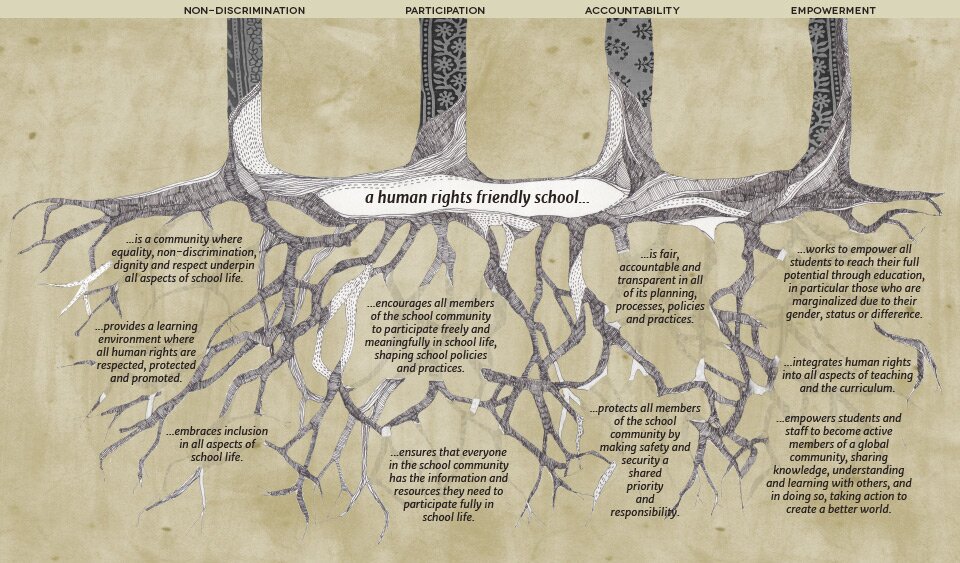















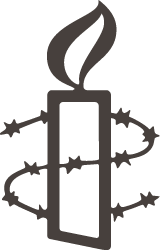














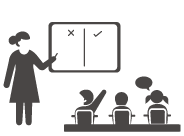
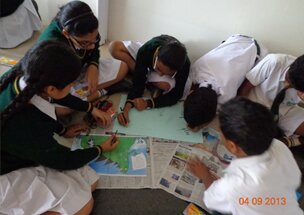
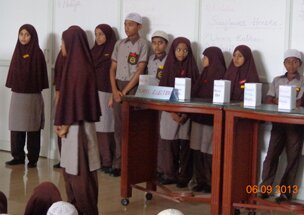



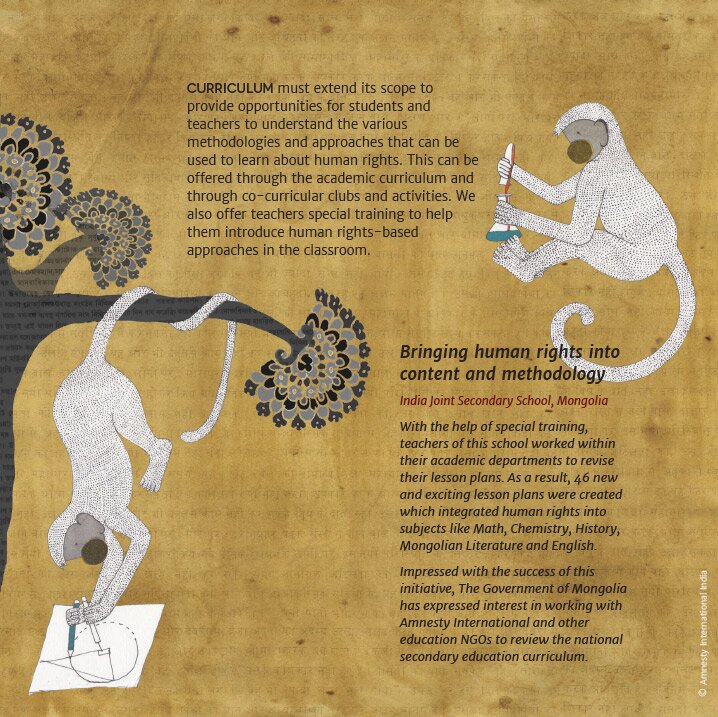
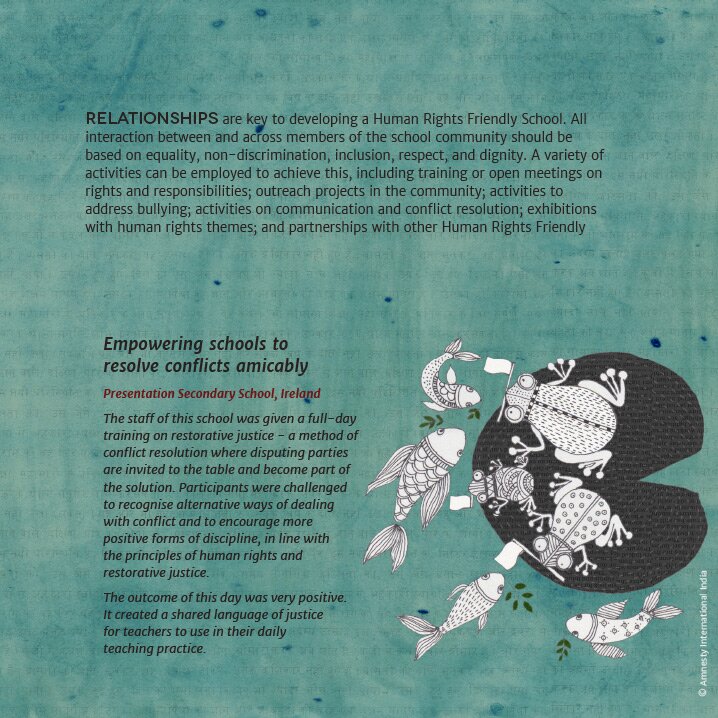
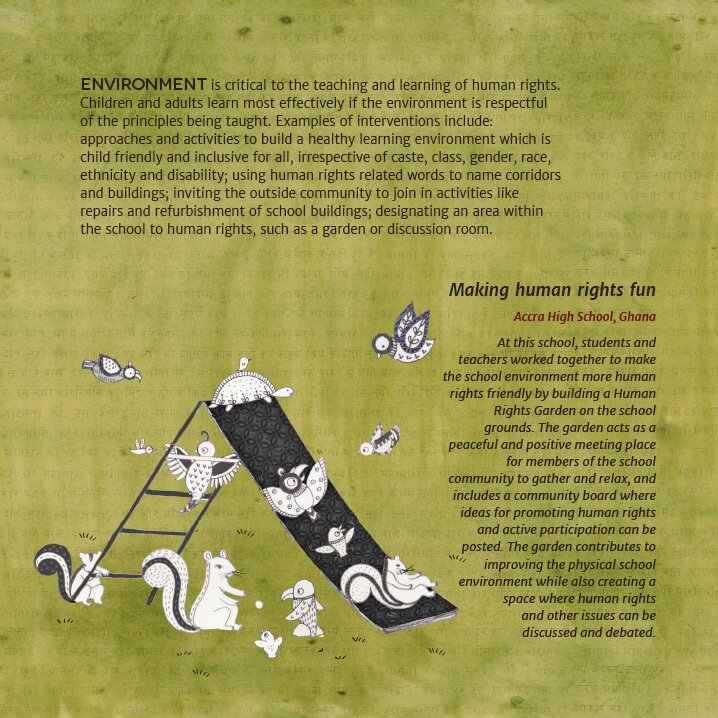
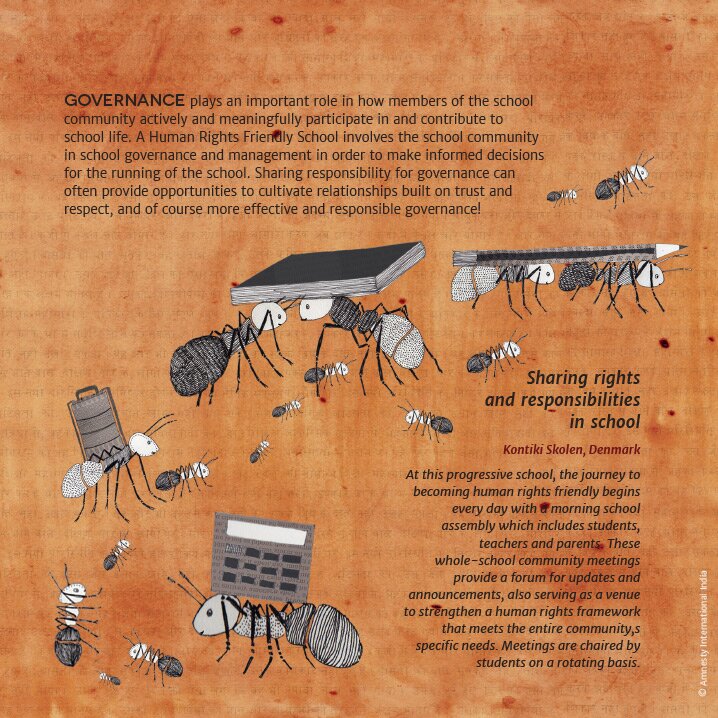


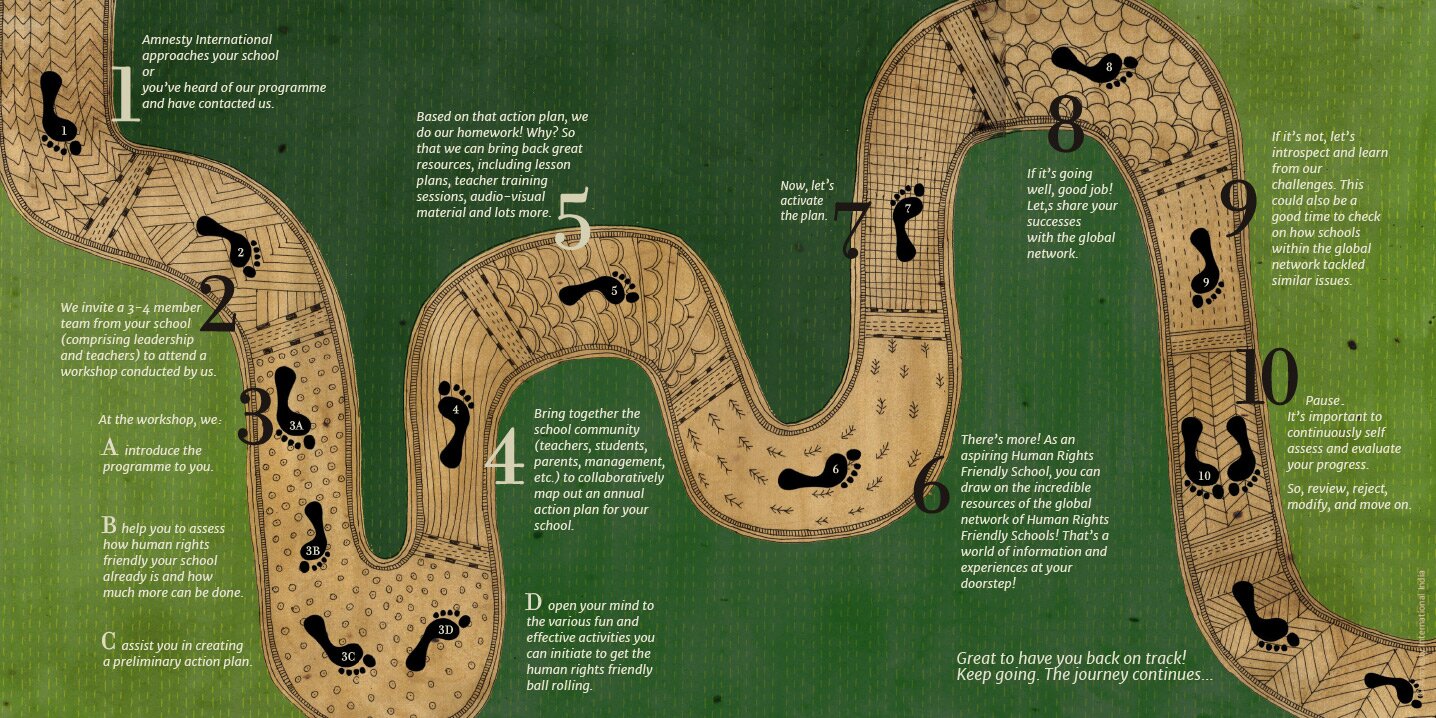


 Leads the Human Rights for Education team in developing the Human Rights Education Programme with schools communities, resource networks and the wider public | BA in Architecture before joining the development sector | MA in Gender and a management degree | Previously worked as Senior Policy Advisor Global Climate and Energy Team for WWF | Lead author of Building an Equitable Green Economy, commissioned as a contribution to the Rio+20 Environment and Development Conference | Previously worked for various development bi-lateral and multi-lateral organisations - researching, assessing, evaluating and training | Enjoys playing tennis, singing/music and doing intricate jigsaw puzzles
Leads the Human Rights for Education team in developing the Human Rights Education Programme with schools communities, resource networks and the wider public | BA in Architecture before joining the development sector | MA in Gender and a management degree | Previously worked as Senior Policy Advisor Global Climate and Energy Team for WWF | Lead author of Building an Equitable Green Economy, commissioned as a contribution to the Rio+20 Environment and Development Conference | Previously worked for various development bi-lateral and multi-lateral organisations - researching, assessing, evaluating and training | Enjoys playing tennis, singing/music and doing intricate jigsaw puzzles Supports schools to integrate human rights education into school life | MA Sociology, MA Elementary Education (currently pursuing) | Previously a teacher-educator for government school teachers across Karnataka covering areas of social studies, teacher professional development and integrating technology into education | Also worked with youth groups on urban governance, youth participation and climate change | Passionate about travel and food
Supports schools to integrate human rights education into school life | MA Sociology, MA Elementary Education (currently pursuing) | Previously a teacher-educator for government school teachers across Karnataka covering areas of social studies, teacher professional development and integrating technology into education | Also worked with youth groups on urban governance, youth participation and climate change | Passionate about travel and food Works on all communication and media-related aspects of the Human Rights for Education programme | BA in Economics and Commerce & PG Diploma in Social Communications Media| Previously worked in advertising and communications, and as a copywriter with Ambience Publicis Advertising | Volunteered as junior communications officer with Pax Christi International in Brussels & worked with CRY - Child Rights and You | Loves music and food (in no particular order)
Works on all communication and media-related aspects of the Human Rights for Education programme | BA in Economics and Commerce & PG Diploma in Social Communications Media| Previously worked in advertising and communications, and as a copywriter with Ambience Publicis Advertising | Volunteered as junior communications officer with Pax Christi International in Brussels & worked with CRY - Child Rights and You | Loves music and food (in no particular order) Somya is programme officer with Amnesty International India. She holds a Master’s degree in social work from the University of Delhi. Her previous work experience with several National and International organizations has strengthened her belief that children can be change makers if they are empowered. She directly works with students, teachers, schools and NGO partners across the country as part of the HRE programme. She comes to work so that she can go back to school and watch children become change makers.
Somya is programme officer with Amnesty International India. She holds a Master’s degree in social work from the University of Delhi. Her previous work experience with several National and International organizations has strengthened her belief that children can be change makers if they are empowered. She directly works with students, teachers, schools and NGO partners across the country as part of the HRE programme. She comes to work so that she can go back to school and watch children become change makers. Coordinates internal communication, documentation, and monitoring and evaluation of HRE’s work in schools | Also conducts training for Telecalling and Face to face teams in Bangalore and Chennai | BA in Journalism from Delhi University | MA in Social Work | Previously worked for a skill development organization | Experience in working with children in juvenile homes/ youth in observation homes | Theatre enthusiast, trekker and music lover.
Coordinates internal communication, documentation, and monitoring and evaluation of HRE’s work in schools | Also conducts training for Telecalling and Face to face teams in Bangalore and Chennai | BA in Journalism from Delhi University | MA in Social Work | Previously worked for a skill development organization | Experience in working with children in juvenile homes/ youth in observation homes | Theatre enthusiast, trekker and music lover.